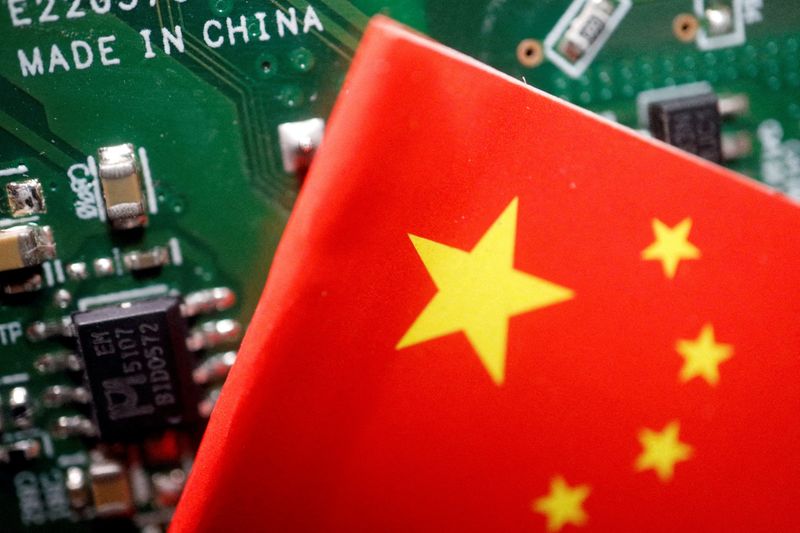By Stephen Nellis and Max A. Cherney
(Reuters) - In a new front in the U.S.-China tech war, President Joe Biden's administration is facing pressure from some lawmakers to restrict American companies from working on a freely available chip technology widely used in China - a move that could upend how the global technology industry collaborates across borders.
At issue is RISC-V, pronounced "risk five," an open-source technology that competes with costly proprietary technology from British semiconductor and software design company Arm Holdings (NASDAQ:ARM). RISC-V can be used as a key ingredient for anything from a smartphone chip to advanced processors for artificial intelligence.
Some lawmakers - including two Republican House of Representatives committee chairmen, Republican Senator Marco Rubio and Democratic Senator Mark Warner - are urging Biden's administration to take action regarding RISC-V, citing national security grounds.
The lawmakers expressed concerns that Beijing is exploiting a culture of open collaboration among American companies to advance its own semiconductor industry, which could erode the current U.S. lead in the chip field and help China modernize its military. Their comments represent the first major effort to put constraints on work by U.S. companies on RISC-V.
Representative Mike Gallagher, chairman of the House select committee on China, said in a statement to Reuters that the Commerce Department needs to "require any American person or company to receive an export license prior to engaging with PRC (People's Republic of China) entities on RISC-V technology."
Such calls to regulate RISC-V are the latest in the U.S.-China battle over chip technology that escalated last year with sweeping export restrictions that the Biden administration has told China it will update this month.
"The CCP (Chinese Communist Party) is abusing RISC-V to get around U.S. dominance of the intellectual property needed to design chips. U.S. persons should not be supporting a PRC tech transfer strategy that serves to degrade U.S. export control laws," Representative Michael McCaul, chairman of the House Foreign Affairs Committee, said in a statement to Reuters.
McCaul said he wants action from the Bureau of Industry and Security, the part of the Commerce Department that oversees export-control regulations, and would pursue legislation if that does not materialize.
The bureau "is constantly reviewing the technology landscape and threat environment, and continually assessing how best to apply our export control policies to protect national security and safeguard core technologies," a Commerce Department spokesperson said in a statement.
"Communist China is developing open-source chip architecture to dodge our sanctions and grow its chip industry," Rubio said in a statement to Reuters. "If we don't broaden our export controls to include this threat, China will one day surpass us as the global leader in chip design."
"I fear that our export-control laws are not equipped to deal with the challenge of open-source software - whether in advanced semiconductor designs like RISC-V or in the area of AI - and a dramatic paradigm shift is needed," Warner said in a statement to Reuters.
RISC-V is overseen by a Swiss-based nonprofit foundation that coordinates efforts among for-profit companies to develop the technology.
The RISC-V technology came from labs at the University of California, Berkeley, and later benefited from funding by the Pentagon's Defense Advanced Research Projects Agency (DARPA). Its creators have compared it to Ethernet, USB and even the internet, which are freely available and draw on contributions from around the world to make innovation faster and cheaper.
HUAWEI TECHNOLOGIES
Executives from China's Huawei Technologies have embraced RISC-V as a pillar of that nation's progress in developing its own chips. But the United States and its allies also have jumped on the technology, with chip giant Qualcomm (NASDAQ:QCOM) working with a group of European automotive firms on RISC-V chips and Alphabet (NASDAQ:GOOGL)'s Google saying it will make Android, the world's most popular mobile operating system, work on RISC-V chips.
Qualcomm declined to comment. Its executives said in August they believe RISC-V will speed up chip innovation and transform the tech industry.
Google did not respond to a request for comment.
If Biden's administration were to regulate U.S. companies' participation in the Swiss-based foundation in the manner lawmakers are seeking, the move could complicate how American and Chinese companies work together on open technical standards. It also could create hurdles for China's pursuit of chip self-sufficiency, as well as for U.S. and European efforts to create cheaper and more versatile chips.
Jack Kang, vice president of business development at SiFive, a Santa Clara, California-based startup using RISC-V, said potential U.S. government restrictions on American companies regarding RISC-V would be a "tremendous tragedy."
"It would be like banning us from working on the internet," Kang said. "It would be a huge mistake in terms of technology, leadership, innovation and companies and jobs that are being created."
Regulating the open discussion of technologies is rarer than regulating physical products, but not impossible, said Kevin Wolf, an export-control attorney at law firm Akin Gump who served in the Commerce Department under former President Barack Obama. Existing rules on chip exports could help provide a legal framework for such a proposal, Wolf said.
